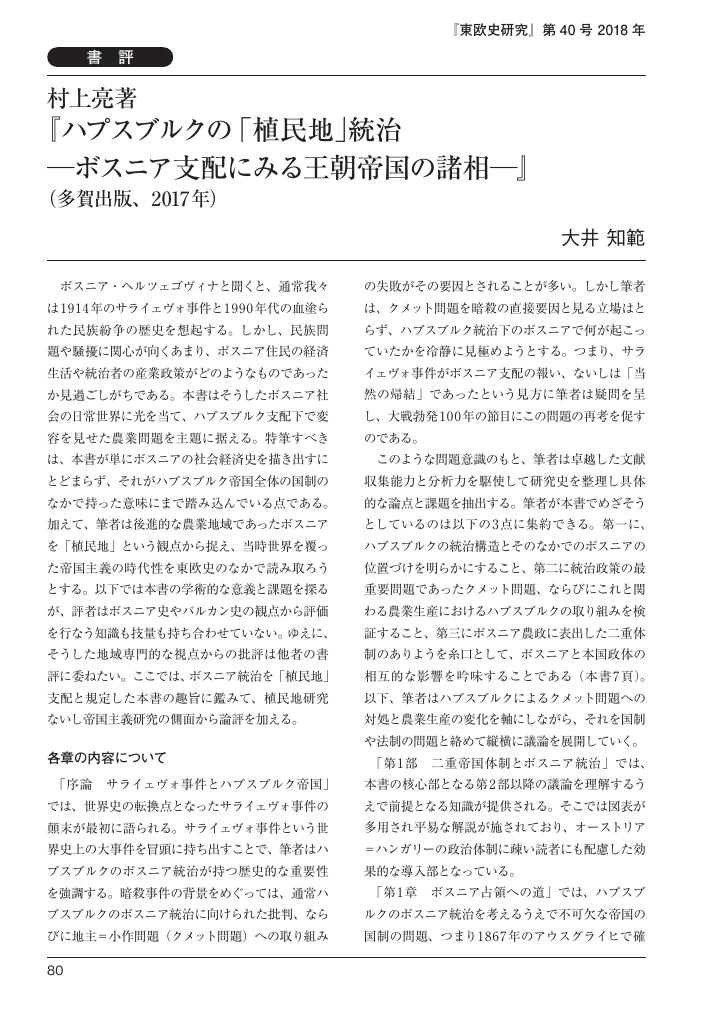25 0 0 0 OA 二〇世紀初頭のハプスブルク帝国海軍と東アジア : 寄港地交流を通じた帝国主義世界への参与
- 著者
- 大井 知範
- 出版者
- 公益財団法人 史学会
- 雑誌
- 史学雑誌 (ISSN:00182478)
- 巻号頁・発行日
- vol.124, no.2, pp.177-209, 2015-02-20 (Released:2017-12-01)
This paper attempts to elicit the reality of the Hapsburg Empire's global seafaring prowess despite its reputation as a mainly continental power, in light of historical findings that an Imperial warship had been stationed in the seas of East Asia approximately 100 years ago. Research regarding Western navies stationed overseas has in the past focused largely on their use as a means of military competition or imperialistic ambitions toward the non-Western world. However, here the author points to another purpose with which warships were deployed overseas; namely, to serve as media for promoting international relations within the daily routine of peacetime conditions. After outlining the deployment system of warships outside of the region of Europe, and the reasons, circumstances and substance of the Hapsburg Empire's stationing of a warship in East Asian waters, the author turns to the specific duties of the ship, in particular, how it performed the very important duty of any Western navy in protecting its country's citizen and commercial interests in the region. However, since the Hapsburg Empire had no overseas interests or citizens to protect in East Asia, it was impossible for the Austro-Hungarians to set up a system of direct protection like that of the other major powers, due mainly to its unique position in having only a single warship to accommodate such needs. The author then addresses the subject of goodwill exchange, which he considers to be the most important daily routine of the Hapsburg warship, and looks there for the ultimate reason for stationing it in East Asian waters. Finally, he focuses on the military band on board the ship, in order to clarify the fact that the Hapsburg Empire was concerned in identifying with maritime coastal society in East Asia through the medium of music. The Hapsburg Empire thus intended to adapt to the imperial order as a major power in East Asia by carefully cultivating various daily peacetime routines.
- 著者
- 大井 知範
- 出版者
- 公益財団法人史学会
- 雑誌
- 史學雜誌 (ISSN:00182478)
- 巻号頁・発行日
- vol.124, no.2, pp.177-209, 2015-02-20
This paper attempts to elicit the reality of the Hapsburg Empire's global seafaring prowess despite its reputation as a mainly continental power, in light of historical findings that an Imperial warship had been stationed in the seas of East Asia approximately 100 years ago. Research regarding Western navies stationed overseas has in the past focused largely on their use as a means of military competition or imperialistic ambitions toward the non-Western world. However, here the author points to another purpose with which warships were deployed overseas; namely, to serve as media for promoting international relations within the daily routine of peacetime conditions. After outlining the deployment system of warships outside of the region of Europe, and the reasons, circumstances and substance of the Hapsburg Empire's stationing of a warship in East Asian waters, the author turns to the specific duties of the ship, in particular, how it performed the very important duty of any Western navy in protecting its country's citizen and commercial interests in the region. However, since the Hapsburg Empire had no overseas interests or citizens to protect in East Asia, it was impossible for the Austro-Hungarians to set up a system of direct protection like that of the other major powers, due mainly to its unique position in having only a single warship to accommodate such needs. The author then addresses the subject of goodwill exchange, which he considers to be the most important daily routine of the Hapsburg warship, and looks there for the ultimate reason for stationing it in East Asian waters. Finally, he focuses on the military band on board the ship, in order to clarify the fact that the Hapsburg Empire was concerned in identifying with maritime coastal society in East Asia through the medium of music. The Hapsburg Empire thus intended to adapt to the imperial order as a major power in East Asia by carefully cultivating various daily peacetime routines.
4 0 0 0 OA 帝政期ドイツにおけるトランスナショナルな人的移動とジェンダー秩序に関する研究
2 0 0 0 IR 第一次世界大戦前のアジア・太平洋地域におけるドイツ海軍--東洋巡洋艦隊の平時の活動と役割
- 著者
- 大井 知範
- 出版者
- 明治大学政治経済研究所
- 雑誌
- 政経論叢 (ISSN:03873285)
- 巻号頁・発行日
- vol.77, no.3, pp.517-549, 2009-03
2 0 0 0 OA 脱植民地化の双方向的歴史過程における「植民地責任」の研究
- 著者
- 永原 陽子 粟屋 利江 鈴木 茂 舩田 さやか 阿部 小涼 今泉 裕美子 小山田 紀子 尾立 要子 小林 元裕 清水 正義 前川 一郎 眞城 百華 濱 忠雄 吉澤 文寿 吉田 信 渡邊 司 津田 みわ 平野 千果子 浅田 進史 飯島 みどり 板垣 竜太 大峰 真理 後藤 春美 高林 敏之 旦 祐介 津田 みわ 中野 聡 半澤 朝彦 平野 千果子 溝辺 泰雄 網中 昭世 大井 知範 柴田 暖子
- 出版者
- 東京外国語大学
- 雑誌
- 基盤研究(A)
- 巻号頁・発行日
- 2007
本研究では、「植民地責任」概念を用いて、脱植民地化過程を第二次世界大戦後の植民地独立期に限定せず、20世紀の世界史全体の展開の中で検討した。その結果、第一次世界大戦期の萌芽的に出現した「植民地責任」論に対し、それを封じ込める形で国際的な植民地体制の再編が行われ、その体制が1960年代の植民地独立期を経て「冷戦」期にまで継続したことが明らかになった。
1 0 0 0 OA オーストリア皇妃エリザベートの婚礼 : 新聞が報じたロイヤル・ウェディング
- 著者
- 大井 知範 Tomonori Oi
- 雑誌
- 清泉女子大学紀要 = Bulletin of Seisen University (ISSN:05824435)
- 巻号頁・発行日
- pp.17-37,
- 著者
- 大井 知範
- 出版者
- 東欧史研究会
- 雑誌
- 東欧史研究 (ISSN:03866904)
- 巻号頁・発行日
- vol.40, pp.80-88, 2018 (Released:2022-02-13)
1 0 0 0 第一次世界大戦前のドイツ海軍と太平洋のイギリス植民地
- 著者
- 大井 知範
- 出版者
- 現代史研究会
- 雑誌
- 現代史研 (ISSN:03868869)
- 巻号頁・発行日
- vol.61, pp.17-30, 2018-06-28
- 著者
- 大井 知範
- 出版者
- 世界史研究会
- 雑誌
- 世界史研究論叢 = The journal of world history research (ISSN:2186442X)
- 巻号頁・発行日
- vol.6, pp.59-78, 2016-10
